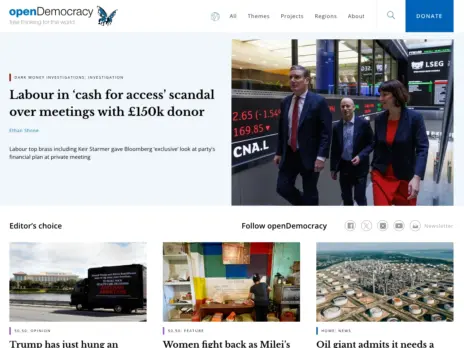By anybody’s reckoning, the next seven days will shape the future of the British media – from television to the regional press.
On Wednesday morning, media regulator Ofcom publishes its final report on the future of public service broadcasting, the result of a lengthy investigation.
Then next Monday, the newly appointed communications minister Stephen Carter unveils his wide-ranging report on creating a “Digital Britain”. According to the Times, it’s already gone to the printers.
And it’s been partly leaked. According to a draft of the report seen by the Financial Times, Carter will reject Channel 4’s bid for part of the licence fee, call for a relaxation of newspaper and radio ownership rules, and suggest merging Channel 4 into a “wider entity”.
Channel 4 has warned of a £150m-a-year funding deficit by the time digital switchover is complete in 2012.
Its founder, Sir Jeremy Isaacs, argues this weekend that some of the broadcaster’s problems are of its own making.
“The paradox of Channel 4 is that it still does some remarkable, excellent programming but there is so much dross,” he told the Sunday Times.
“The channel should be spending far less money on things that don’t contribute to public-service broadcasting,”
According to the FT, Carter’s report “makes it crystal clear” that giving Channel 4 a share of the BBC licence fee “will not happen”.
Instead, the report proposes merging Channel 4 into a part-private part-public entity that is “financially sustainable in the medium term”.
Some are reading that as a merger with Five – an idea that was rejected last week by Channel 4 chief executive Andy Duncan last week as “mixing oil and water”.
Channel 4’s chairman, Luke Johnson, revealed this weekend that he had been in merger talks with Five but came to the conclusion that such a move would be disastrous.
“Having done due diligence before, we can’t see how it makes economic or cultural sense,” he told the Guardian.
“Our preference is not to receive direct cash. Channel 4 has always avoided that. The possibility of some structural solution with BBC Worldwide has its attractions.”
Five’s parent company, RTL Group, is in favour of such a merger.
Its chief executive Gerhard Zeiler wrote in the Financial Times: “A merger that brings together two such complementary broadcasters would create a much stronger operator.
“If the government can be a main shareholder in several of the leading banks, why would it not consider a public/private partnership in broadcasting?”
This new merged body could replace ITV as the provider of alternative regional news in the coming years, according to the Digital Britain draft.
ITV is already scaling back its regional news output – and the BBC has offered to help out by sharing facilities and some non-exclusive footage. This, Carter’s report says, is “inadequate”.
The FT says the Digital Britain report also “rejects [ITV’s] claims that most of its financial problems derive from having to pay to make programmes that are part of its PSB licence”.
Ofcom is expected to recommend that ITV regain control of its lucrative breakfast time schedule. The period between 6am and 9.30am is currently operated under licence by GMTV – which made a £14m profit last year, according to the Observer.
As for the regional press, it looks like Digital Britain will recommend that the Office of Fair Trading review the competition law applying to regional newspapers and local radio.
But the report’s attitude to BBC Worldwide, the corporation’s commercial arm that has incurred the wrath of many a commercial media group, might not be so welcome for newspapers and magazines. The FT suggests that Worldwide’s remit will be less closely linked to the BBC’s output.
Email pged@pressgazette.co.uk to point out mistakes, provide story tips or send in a letter for publication on our "Letters Page" blog






